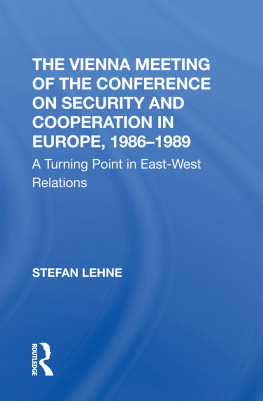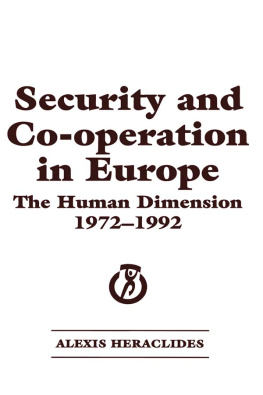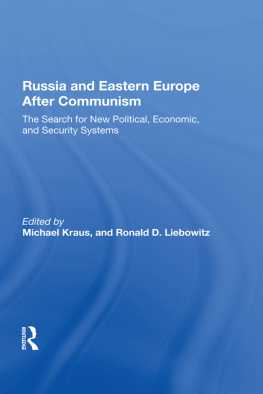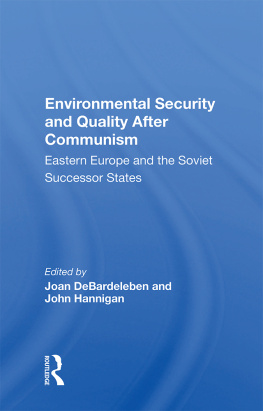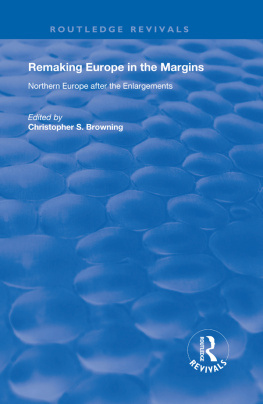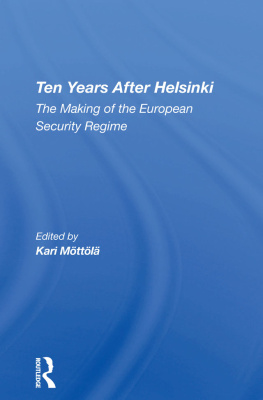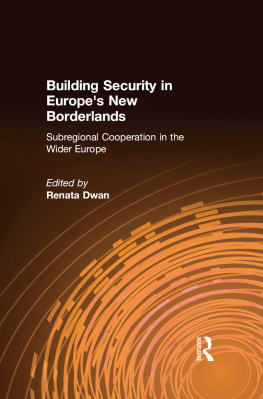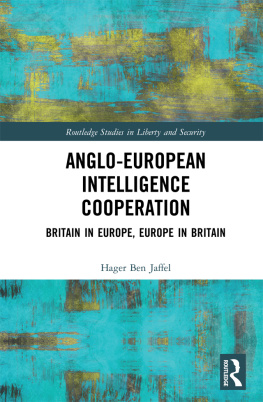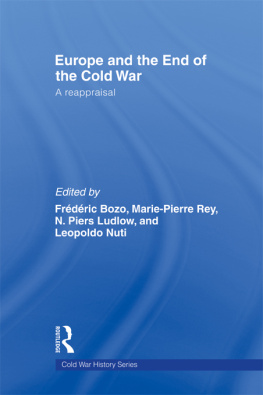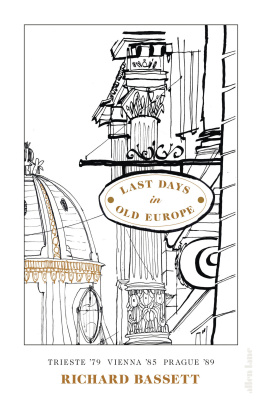THE VIENNA MEETING OF THE CONFERENCE ON SECURITY AND COOPERATION IN EUROPE, 1986-1989
Austrian Institute for International Affairs Series
The Austrian Institute for International Affairs (AHA) is an independent research institution for the scientific study of current issues of Austrian foreign policy and international relations.
The Vienna Meeting of the Conference on Security and Cooperation in Europe, 1986-1989: A Turning Point in East-West Relations, Stefan Lehne
Forthcoming
The European Neutrals in the 1990s: New Challenges and Opportunities, edited by Hanspeter Neuhold
Unequal Partners: Relations Between Austria and the Federal Republic of Germany and Canada and the United States Compared, edited by Harald von Riekhoff and Hanspeter Neuhold
The Vienna Meeting of the Conference on Security and Cooperation in Europe, 1986-1989
A Turning Point in East-West Relations
Stefan Lehne
First published 1991 by Westview Press, Inc.
Published 2019 by Routledge
52 Vanderbilt Avenue, New York, NY 10017
2 Park Square, Milton Park, Abingdon, Oxon OX14 4RN
Routledge is an imprint of the Taylor & Francis Group, an informa business
Copyright 1991 Taylor & Francis
All rights reserved. No part of this book may be reprinted or reproduced or utilised in any form or by any electronic, mechanical, or other means, now known or hereafter invented, including photocopying and recording, or in any information storage or retrieval system, without permission in writing from the publishers.
Notice:
Product or corporate names may be trademarks or registered trademarks, and are used only for identification and explanation without intent to infringe.
Library of Congress Cataloging-in-Publication Data
Lehne, Stefan.
The Vienna Meeting of the Conference on Security and Cooperation in Europe, 1986-1989: a turning point in East-West relations / by Stefan Lehne.
p. cm.(Austrian Institute for International Affairs series)
ISBN 0-8133-8131-2
1. Conference on Security and Cooperation in Europe Follow-up Meeting (1986: Vienna, Au stria) 2. European cooperation. 3. Security, International. 4. EuropeMilitary policy. I. Title. II. Series.
JX1393.C65L44 1991
327.1'7'094dc20
90-46432
CIP
ISBN 13: 978-0-367-29708-4 (hbk)
- BBC British Broadcasting Corporation
- CBM Confidence-Building Measure
- CDE Conference on Confidence- and Security-Building Measures and Disarmament in Europe
- CFE Conventional Armed Forces in Europe
- CMEA Council of Mutual Economic Assistance
- COCOM (NATO) Coordinating Committee (for Multilateral Export Controls)
- CPSU Communist Party of the Soviet Union
- CSBM Confidence- and Security-Building Measure
- CSCE Conference on Security and Cooperation in Europe
- EC European Community
- ECE (UN) Economic Commission for Europe
- FRG Federal Republic of Germany
- GATT General Agreement on Tariffs and Trade
- GDR German Democratic Republic
- HLTF High-Level Task Force
- IMF international Monetary Fund
- INF Intermediate (-Range) Nuclear Forces
- ITU International Telecommunication Union
- MBFR Mutual and Balanced Force Reduction
- MFN Most Favored Nation
- + Neutral and Nonaligned (CSCE Participating States)
- NATO North Atlantic Treaty Organization
- NGO Nongovernmental Organization
- OECD Organization for Economic Cooperation and Development
- SALT Strategic Arms Limitation alks
- SDI Strategic Defense Initiative
- START Strategic Arms Reduction alks
- U.N. United Nations
- VCD Vienna Concluding Document
From its beginning in the early 1970s the Helsinki process had always played an ambivalent role in East-West relations. While the East perceived the Helsinki Final Act primarily as a recognition of the territorial status quo, the West saw it as a program for liberalization and reform. The evolution of the CSCE process after the summit meeting in 1975 reflected the ups and downs in East-West relations, but it also provided an instrument to influence this relationship. It helped to preserve dialogue and a minimum of cooperation in times of tensions, yet at the same time served as an ideological battleground and was used by Western governments to aggravate the legitimacy crisis of Eastern regimes and to support opposition activities. The emergence of a "civil society" in several Eastern countries, a crucial requirement for the events of 1989, was closely linked to the development of the CSCE process.
This volume focuses on the third CSCE Follow-Up Meeting which took place in Vienna from November 1986 to January 1989 against the background of dynamic developments in Eastern Europe. When the meeting started, East-West relations were already improving, but the political constellation of the CSCE process, two antagonistic blocs and the group of neutral and non-aligned countries, remained in place. When it ended, the Eastern bloc was disintegrating and the division of Europe was approaching its end. The development of the conference reflected the changing situation in the East, the vanguard role of Hungary and Poland, the initially painfully slow but later dramatic change in the Soviet positions, and the increasingly desperate rearguard action of the German Democratic Republic, Czechoslovakia, Bulgaria and Romania. While its course was shaped by the developments in Eastern countries, the conference in turn, particularly through its open and detailed debates on human rights, helped to reinforce the tendencies toward systemic change. The human rights agreements which resulted from many months of negotiations much more concrete than those in previous CSCE documents signaled an end to the traditional confrontation of two incompatible human rights philosophies and turned human rights into a uniting element in European politics.
The achievements of the Vienna meeting in the other pivotal area of the CSCE process, military security, were no less significant. By initiating new negotiations on the reduction of conventional armed forces in Europe (CFE) the meeting opened a new chapter in the history of arms control and disarmament. The key question of military security in Europe, the imbalances of conventional forces, for the first time became the subject of serious negotiations. The Vienna meeting thereby opened the perspective for drastic cuts in the level of military forces and armaments stationed in Europe and for a substantially improved security environment.
The study sums up the development of the CSCE process from the preparatory consultations in 1972 up to the beginning of the Vienna meeting. Following an analysis of the state of East-West relations at the outset of the Vienna meeting, the principal issues before the conference are set out. The course of the negotiations and the results of the conference are discussed against the background of the development of East-West relations. A postscript deals with the contribution of the CSCE process to the revolutions of 1989 and sketches possible options for the future development of this process as a framework for a new European order.
This book is based on my experience as a member of the Austrian delegation to the Vienna meeting as well as on many discussions with colleagues from other CSCE countries. My thanks are extended to the Austrian Institute for International Affairs which provided me with a congenial and intellectually stimulating environment. I am particularly grateful to the Institute's director, Professor Hanspeter Neuhold, without whose encouragement and support this project would not have been possible. Funding was provided by the Jubilee Fund of the Austrian National Bank and the Austrian Science Foundation. All of the views expressed are strictly my own and in no way represent any official attitude.

